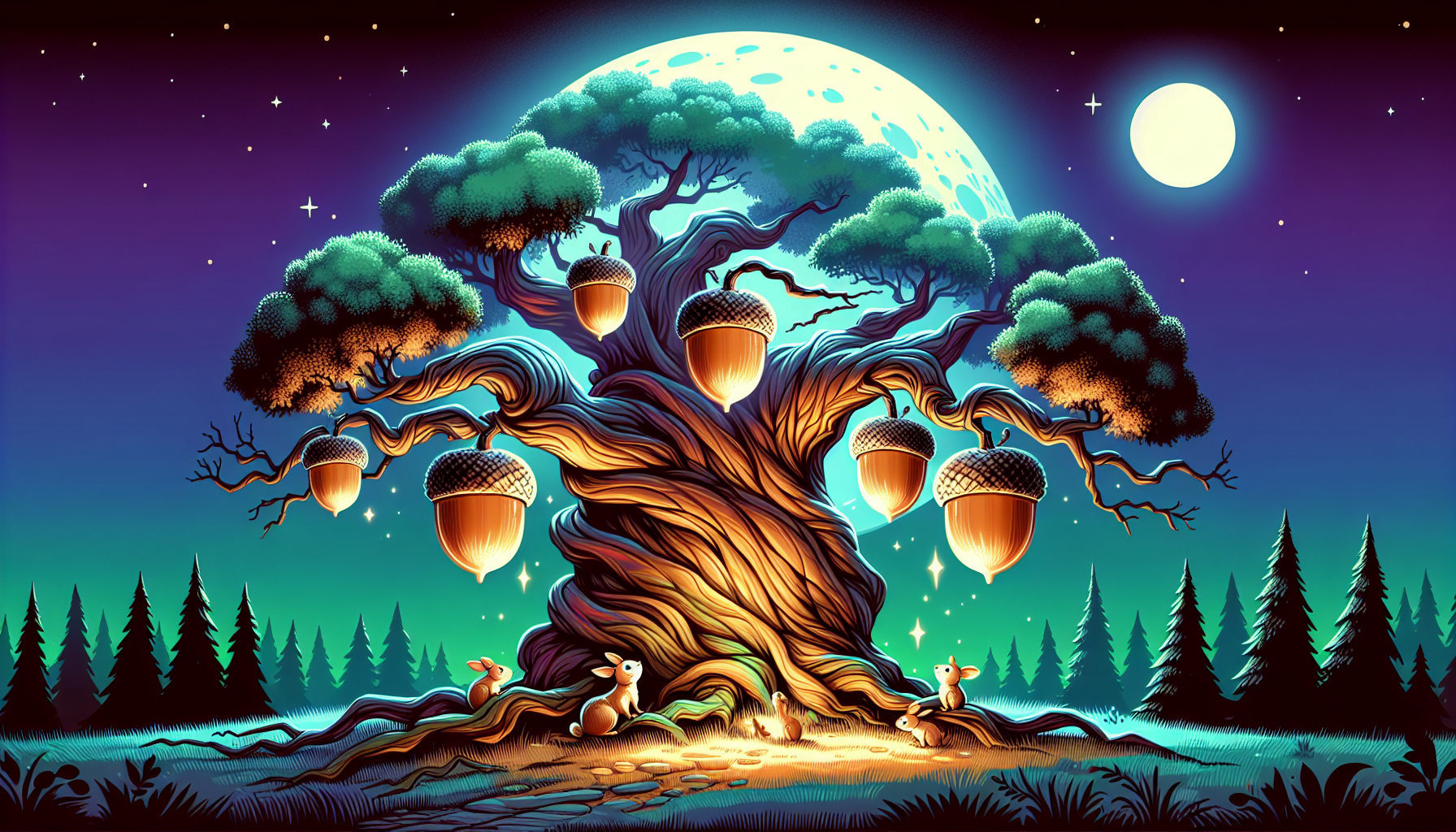Unlocking the Symbolic Meanings of Acorns
Have you ever taken a closer look at an acorn and wondered about the significance behind this humble little nut? Well, let me tell you, my friend, that acorn you carelessly tossed aside carries a wealth of symbolic meaning that spans cultures and ages. It’s a tiny time capsule packed with stories and significance that will blow your mind!
Cultural and Historical Significance
Ancient Symbolism
Acorns have been revered since ancient times. In Norse mythology, the oak tree, and by extension its acorns, were associated with Thor, the god of thunder. These mighty trees were believed to attract lightning, making acorns sacred symbols of protection against nature’s powerful forces.
In Celtic symbolism, the oak tree is a sacred symbol of durability, purity, and constancy – qualities naturally attributed to the humble acorn.
Native American Influence
Among various Native American tribes, the acorn represented life and fertility. Tribes like the Miwok and Pomo of California used acorns as a major food source, grinding them into meals for bread and mush.
The acorn symbolizes providence and the sustenance of life, reflecting the balance of taking only what is needed from nature.
A Vital Food Source
For many indigenous cultures, particularly in North America and parts of Europe, acorns were more than just symbols – they were a crucial source of sustenance. These communities harnessed the acorn’s nutritional value by:
- Leaching out tannins
- Grinding them into flour for bread and mush
Acorns were a reliable food source, helping cultures endure harsh winters and times of scarcity – a true symbol of resilience.
Spiritual and Inspirational Meanings
Symbol of Potential and Growth
One of the most powerful symbolic meanings of the acorn is its representation of potential. Just as a mighty oak tree grows from a humble acorn, this nut symbolizes the potential for immense growth and transformation.
This makes the acorn an inspirational symbol, often used in motivational contexts to encourage individuals to realize their full potential, no matter their origins.
Connection to Longevity and Immortality
The acorn frequently symbolizes longevity and immortality, partly because of the oak tree’s lengthy lifespan and its ability to regenerate after disasters like fires or lightning strikes.
In many cultures, acorns are tokens of the perpetual nature of life, leading to their use as amulets for protection and strength.
Hidden Potential Within
The acorn represents the immense potential contained within a seemingly small seed. It reminds us that even the most humble beginnings can hold the power for great growth and achievement.
The acorn’s journey from a small nut to a mighty oak symbolizes the power of transformation. It encourages us to be patient with ourselves and trust the process of growth, even when it feels slow.
The oak tree’s deep roots and enduring presence are reflected in the acorn, representing inner strength, stability, and the ability to weather life’s storms. By connecting with the acorn’s symbolism, we cultivate resilience and a sense of groundedness.
Acorns in Folklore and Literature
Acorns have left an indelible mark on folklore and literature across the globe. Their journey from tiny seeds to mighty oaks has captured imaginations and woven rich narratives exploring growth, resilience, and magic.
Folkloric Symbolism
- Good Luck and Prosperity: In many cultures, acorns represent good luck and prosperity. Carrying an acorn or keeping one in your home might attract good fortune.
- Protection and Strength: Drawing from the oak’s enduring presence, acorns are seen as charms for protection and strength. They are worn or placed in homes to ward off evil spirits or misfortune.
- Fertility and New Beginnings: The acorn’s potential for growth makes it a symbol of fertility and new beginnings. It might be featured in fertility rituals or given as tokens of hope for starting a family.
Fairytales and Myths
- Magical Transformations: Acorns often appear in fairytales as seeds of magical transformations. Eating an acorn might transform someone into an animal, grant wishes, or unlock hidden abilities.
- Hidden Treasures and Quests: Acorns can act as clues or markers leading to hidden treasures or lost kingdoms. They symbolize the wisdom and secrets buried deep within nature.
- Connection to the Otherworld: In Celtic folklore, the oak, and by extension the acorn, is associated with the faerie realm. Acorns might be seen as gateways to the Otherworld, offering glimpses into magical dimensions.
Literary References
- William Shakespeare: In “As You Like It,” Shakespeare uses the acorn to symbolize potential and hidden strength, comparing a young boy to an acorn and suggesting great potential within a small form.
- J.R.R. Tolkien: In “The Lord of the Rings,” the entwined golden and silver acorns are the heraldic device of the Elven kingdom of Lothlórien, representing nobility, wisdom, and the enduring nature of the Elves.
- C.S. Lewis: The Chronicles of Narnia series features a talking tree named Treebeard, which mentions collecting acorns, a metaphor for preserving knowledge and the potential for future growth.
Modern Symbolism
In contemporary times, the acorn continues to resonate with powerful symbolism.
Sustainability and Environmentalism
With growing concerns about deforestation and climate change, the acorn has become a symbol of sustainability and environmental awareness. It represents the importance of protecting our forests and nurturing the potential for future generations of trees.
Many urban reforestation efforts use the acorn as their emblem, representing their mission to transform barren landscapes into thriving green spaces.
Resilience in a Changing World
The acorn’s ability to thrive in various conditions makes it a symbol of resilience in the face of modern challenges. It encourages us to adapt, overcome obstacles, and find ways to grow even in uncertain times.
Potential for Innovation
The complex design and untapped potential within the acorn inspire innovation in various fields. Biomimicry, for example, draws inspiration from nature to create sustainable solutions, and the acorn’s structure might inspire new technologies or materials.
Conclusion
The acorn’s journey from a simple nut to a towering oak is symbolic in itself. Within its small form lies the latent capability to grow into something much greater.
Across cultures and through the ages, the acorn has been endowed with profound meanings – from protection and strength to growth and potential. This rich symbolism ensures that the acorn remains a powerful and enduring emblem in both traditional lore and modern narratives.
So, the next time you come across an acorn, take a moment to appreciate its intricate design and the incredible journey it represents – from a tiny seed to a mighty oak, standing tall as a testament to the enduring power of nature and the human spirit.
FAQ
Are acorns a good luck symbol?
In many cultures, acorns are seen as symbols of good luck and prosperity. Carrying an acorn or keeping one in your home might be seen as attracting good fortune. This association likely stems from the acorn’s potential to grow into a mighty oak, symbolizing abundance and future bounty.
What does an abundance of acorns indicate?
An abundance of acorns, known as a “mast year,” can have different interpretations:
A sign of a plentiful harvest: In some cultures, a mast year is seen as a sign of a coming bountiful harvest, not just for acorns but for other crops as well.
Renewal and regeneration: The abundance of acorns signifies the potential for forest regeneration and the continuation of the oak tree’s legacy.
A reminder of nature’s cycles: A mast year can be a reminder of the cyclical nature of life, with periods of abundance followed by periods of scarcity.
Do acorns have healing properties?
While not a mainstream medicine, some traditional practices have attributed certain healing properties to acorns. However, it’s important to consult with a healthcare professional before using them for any medicinal purposes.
What is the old saying about acorns?
There are a few proverbs and sayings related to acorns:
“Mighty oaks from little acorns grow” emphasizes the potential for great things to come from small beginnings.
“Acorns fall near the parent tree” refers to the tendency for offspring to share characteristics with their parents.
Do acorns have energy?
In some spiritual traditions, acorns are seen as possessing a vital life force or energy. This energy is associated with growth, potential, and connection to the earth.







